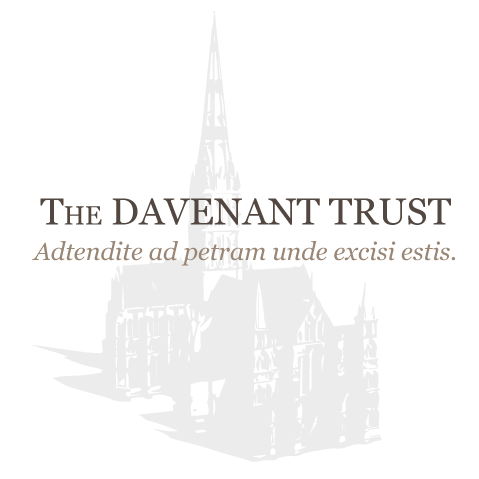Recently, IRD had the privilege of interviewing Dr. W. Bradford Littlejohn, who holds a Ph.D. from the University of Edinburgh. He now serves on the board of directors for The Davenant Trust, an organization that aims “to equip evangelical and Reformed Christians today for church leadership, civic participation, and faithful discipleship in other vocations as responsible citizens, by encouraging scholarly research into the time-tested resources of early Protestant theology, philosophy, ethics, civics, and jurisprudence, and by putting these resources at the disposal of the contemporary church.” Not only is he of the much-touted “Millennial” generation, he is also more importantly an insightful scholar who shows great adeptness in political theology, which is a very important “upstream” foundation for all of IRD’s endeavors. He was kind enough to share some of his thoughts and time with IRD. This is Part 1 of a four part series.
IRD: Let’s talk about the Davenant Trust. Its mission and vision are already pretty explicit, but I want to ask some clarifying questions. One of the stated goals is “to sponsor Christian resourcement in scholarship.” In layman’s terms, what is “resourcement” and how is it done?
Dr. Brad Littlejohn: Heh, yes, we’ve been getting this question a lot. The word is not in very many English dictionaries, though most theology wonks will quickly recognize it as the Anglicized form of the French ressourcement, a word that has become quite faddish as the mid-20th century Catholic nouvelle theologie, with which it was associated, has captured the interest of many Protestants. You could say that we’re, in a slightly tongue-in-cheek way, trying to recapture the term from that fad. For of course the French term means “return to the sources,” or, as the Reformers would have said, ad fontes, and is thus every bit as much a Protestant watchword as a Catholic one. While we applaud and enthusiastically support the modern renewal of Patristic studies (prompted in part by the nouvelle theologie), and the new enthusiasm for the Fathers among many Protestants, we worry that in the midst of this rush to the past, we are at risk of trampling over several of the intervening centuries, imagining that we are already well-familiar with them, when we are anything but. For us today, a “return to the sources” must include a return to the 16th and 17th-century architects of Protestant theology. So that’s the primary meaning of “resourcement” for us, captured well in our motto, Adtendite ad petram unde excisi estis—“Look to the rock from which you have been cut.”
But there’s a second, related meaning. In contemporary parlance, the word “resource” has often come to be used as a verb, meaning more or less “to equip with needed resources.” Without pronouncing on the merit of this neologism, I would say that this helps capture the other half of what we’re up to at Davenant—we’re not just going back to the past as antiquarian scholars, but we’re trying to take from it concrete resources that will better equip contemporary Protestant churches for their mission of evangelism, discipleship, and public engagement.
I should add, too, that while we will definitely need ongoing financial support, Davenant intends to be much more than a mere grant-making body. A lot of what we are doing, we hope, is going to be a matter of marshalling human capital, putting the right people in touch with one another at the right time, providing a beacon for people who share our vision, or a piece of it at any rate, to come together with bright ideas, make connections, and make important projects and events happen.
IRD: So you hope to combine resourcement with fellowships, conferences, and other opportunities for graduate students. You’re basically calling for a renewal of classical Protestant intellect. That seems like a long-term and ambitious purpose. What inspired you and your fellow board members to pursue the establishment of Davenant Trust?
Littlejohn: Well, a lot of different people and ideas providentially came together. The idea initially came to me, as ideas were wont to do, on one of my rain- and wind-swept walks past the Palace of Holyroodhouse and up the Royal Mile when I was wrapping up my Ph.D in Edinburgh. At the time, I thought it was just another of my own crazy private schemes, but as I spoke to some friends, who now make up the Board of Directors, I found that the vision really answered to a widely-felt need. Some elements of that need are (1) the growing disconnect between theological higher education and both the church on the one hand and the academic job market on the other hand; (2) the need for a historically-grounded “mere Protestantism” (more on that later); (3) the lack of a coherent social-political vision, or the resources to construct such a vision, among contemporary Protestants who value public engagement; (4) the largely untapped potential of digital technology to revolutionize scholarship in the humanities in general and historical theology in particular.
For me personally, as I was looking out upon the wasteland of the academic job market and seeking to discern my own vocation as a theological ethicist and historian for the church, I just decided it was time to try and do something different—something where I could really use my particular gifts and connections (and I’ve been blessed with a wonderful network of talented and visionary folks) to have the maximum positive impact for the church. Since I’m also licensed as an investment advisor, I knew a thing or two about money, and thought maybe I could try to attract other folks to get behind the same vision. From there, all the pieces just seemed to come together, and we incorporated last fall and launched publicly in February. Of course, we’re still very much in the “leap of faith” stage, waiting to see if the vision attracts enough support to enable us to fulfill many of these ambitious goals over the long-term, but we’ve made an exciting start.
No comments yet




